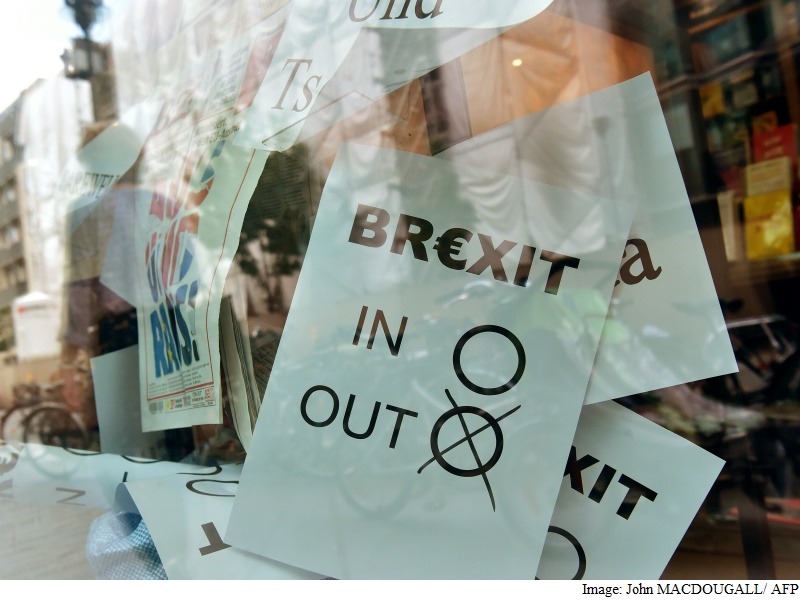- Home
- Internet
- Internet News
- Brexit: The British Are Frantically Googling What the EU Is, Hours After Voting to Leave It
Brexit: The British Are Frantically Googling What the EU Is, Hours After Voting to Leave It

Awakening to a stock market plunge and a precipitous decline in the value of the pound that Britain hasn't seen in more than 30 years, voters now face a series of economic shocks that analysts say will only worsen before they improve. The consequences of the leave vote will be felt worldwide, even here in the United States, and some British voters say they now regret casting a ballot in favor of Brexit.
"Even though I voted to leave, this morning I woke up and I just - the reality did actually hit me," one woman told the news channel ITV News. "If I'd had the opportunity to vote again, it would be to stay."
That confusion over what Brexit might mean for the country's economy appears to have been reflected across the United Kingdom on Thursday. Google reported sharp upticks in searches not only related to the ballot measure but also about basic questions concerning the implications of the vote. At about 1am Eastern time, about eight hours after the polls closed, Google reported that searches for "what happens if we leave the EU" had more than tripled.
The run-up to the vote was marked by a bitterly divided campaign, one that was as much about immigration fears as it was about the global economy. But despite the all-out attempts by either side to court voters, Britons were not only mystified by what would happen if they left the E.U.- many seemed not to even know what the European Union is.
Google Trends tweeted, "What is the EU?" is the second top UK question on the EU since the #EURefResults were officially announced"
What is the EU? To be fair, that question will now take on a much deeper significance than perhaps Google's users realized when they typed that into their browsers.
© 2016 The Washington Post
For the latest tech news and reviews, follow Gadgets 360 on X, Facebook, WhatsApp, Threads and Google News. For the latest videos on gadgets and tech, subscribe to our YouTube channel. If you want to know everything about top influencers, follow our in-house Who'sThat360 on Instagram and YouTube.
Related Stories
- Samsung Galaxy Unpacked 2025
- ChatGPT
- Redmi Note 14 Pro+
- iPhone 16
- Apple Vision Pro
- Oneplus 12
- OnePlus Nord CE 3 Lite 5G
- iPhone 13
- Xiaomi 14 Pro
- Oppo Find N3
- Tecno Spark Go (2023)
- Realme V30
- Best Phones Under 25000
- Samsung Galaxy S24 Series
- Cryptocurrency
- iQoo 12
- Samsung Galaxy S24 Ultra
- Giottus
- Samsung Galaxy Z Flip 5
- Apple 'Scary Fast'
- Housefull 5
- GoPro Hero 12 Black Review
- Invincible Season 2
- JioGlass
- HD Ready TV
- Laptop Under 50000
- Smartwatch Under 10000
- Latest Mobile Phones
- Compare Phones
- Vivo X200 Ultra
- Vivo X200s
- Oppo K13 5G
- Infinix Note 50s 5G+
- Itel A95 5G
- Samsung Galaxy M56 5G
- HMD 150 Music
- HMD 130 Music
- Asus ExpertBook P3 (P3405)
- Asus ExpertBook P1 (P1403)
- Moto Pad 60 Pro
- Samsung Galaxy Tab Active 5 Pro
- Redmi Watch Move
- Oppo Watch X2 Mini
- Xiaomi X Pro QLED 2025 (43-Inch)
- Xiaomi X Pro QLED 2025 (55-Inch)
- Nintendo Switch 2
- Sony PlayStation 5 Pro
- Toshiba 1.8 Ton 5 Star Inverter Split AC (RAS-24TKCV5G-INZ / RAS-24TACV5G-INZ)
- Toshiba 1.5 Ton 5 Star Inverter Split AC (RAS-18PKCV2G-IN / RAS-18PACV2G-IN)

















